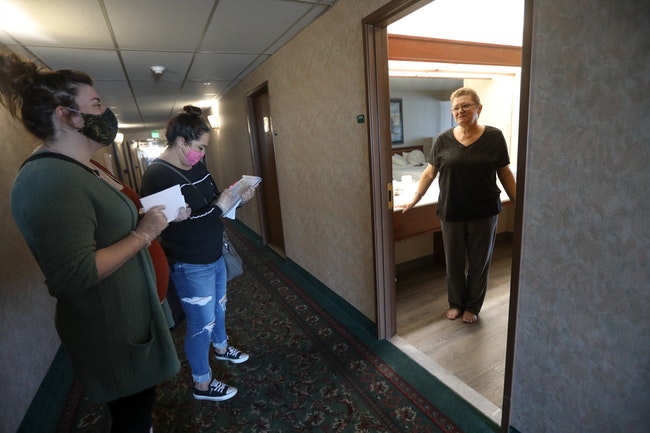 ARCHES project outreach workers Ali Stephens, left, and Lucy Briseno talk with motel resident Diane Murphy about a newly instituted curfew at a Salem motel being used to house the homeless on Thursday, April 9. (Amanda Loman/Salem Reporter)
ARCHES project outreach workers Ali Stephens, left, and Lucy Briseno talk with motel resident Diane Murphy about a newly instituted curfew at a Salem motel being used to house the homeless on Thursday, April 9. (Amanda Loman/Salem Reporter)
Oregon’s Bureau of Labor and Industries is investigating complaints that nearly a dozen Salem-area hotels have refused to house homeless people who are sick or at high risk for COVID-19 during the pandemic.
Labor Commissioner Val Hoyle said her agency heard concerns from Gov. Kate Brown’s office and nonprofit organizations that work with homeless people. It’s become more pronounced since local cases of COVID-19 prompted organizations to try to shelter those vulnerable to illness.
“There are larger housing needs, less resources available and a more urgent need to get people into some places where they can wash their hands and limit contact,” Hoyle said.
State laws on housing discrimination and public accommodations don’t specifically prohibit discrimination against homeless people, but don’t allow hotels to discriminate on the basis of disability, which could include illness, or method of payment.
Jimmy Jones, executive director of the Mid-Willamette Valley Community Action Agency, said his operation has struggled to get homeless people into some local hotels because they won’t accept a third party paying for the room.
BOLI has received 12 reports statewide of hotels unwilling to house homeless residents, according to BOLI spokeswoman Jenny Smith. Eleven of those are in the Salem area. Smith said because those investigations are active, the agency wouldn’t publicly identify them until warning letters have been issued.
Hoyle said similar problems in Eugene have left Lane County officials without enough rooms to house the homeless and prevent them from getting sick.
Community Action Agency is paying for about 125 homeless residents to live in hotels and motels during the pandemic at a cost of about $70,000 per week, Jones said. But their waitlist is about 150 people who they can’t put in hotels, both because of the agency’s lack of money and lack of available rooms.
Only two of those they’ve housed have tested positive for COVID-19, Jones said. Several others had similar symptoms before testing was widely available, but most are simply at greater risk of serious illness should they catch the virus because of age or underlying health conditions, especially chronic lung disease.
“The unsheltered population can’t follow the public health advice. They can’t practice social distancing very well,” he said. A Centers for Disease Control and Prevention report published this week found high rates of COVID-19 infection in homeless shelters when residents were tested and noted shelters are often crowded, impeding social distancing that requires people to stay six feet apart.
Some hotels, including the Salem’s Shiloh Inn, HomeTowne Studios and La Quinta, “have done a fantastic job” housing their clients, Jones said. But he’s found four or five who have been unwilling because of concerns about payment method, fear of damage or illness.
Staff at one local hotel kicked a guest out, saying they had COVID and needed to leave, Jones said. The person didn’t have COVID, he said.
Some shared concerns about guests damaging rooms. Jones said about 5% of their clients have damaged rooms by smoking or forgetting about running bathtubs. Community Action Agency pays for a security guard at Shiloh Inn, and mobile teams also check in daily with residents to make sure they’re okay and to deliver needed supplies.
“We’re not just putting them in motels and then stepping away from them,” he said.
He declined to name the hotels the agency has had problems with because he’s hopeful they can be educated about the law and work together in the future. Jones said he’s heard similar reports from service providers across Oregon.
Jason Brandt, executive director of the Oregon Restaurant and Lodging Association, said the association is working to connect willing hotels and motels with county health departments and other service providers to house homeless people during the pandemic.
He and Hoyle, the labor commissioner, pointed to successful efforts in the Portland area. There, the Jupiter Hotel agreed to become a temporary shelter for those vulnerable to the illness.
Brandt said the state’s contention that hotels can’t discriminate against people with COVID-19 or those pay is a “gray area of the law.”
“It becomes a moot point if we can solve this issue by finding those lodging partners that are willing to enter into that contractual partnership with counties,” he said.
Brandt said housing homeless people in hotels is most effective when counties or agencies serving homeless people can rent the entire hotel and provide trained social workers or other staff to check on guests. He said property owners should be protected from the cost of repairing damaged rooms.
Hoyle said her agency will first warn hotels and work with them to follow the law, she said, before assessing fines or other penalties.
She said isolating homeless people who are sick or at risk is crucial during a pandemic to prevent illness from spreading.
“We have a need, if we want to control public health, to keep people who are sick or infected or vulnerable in a place where they’re not going to infect other people,” she said.
SUPPORT SALEM REPORTER’S JOURNALISM – A monthly subscription starts at $5. Go HERE. Or contribute to keep our reporters and photographers on duty. Go HERE. Checks can be sent: Salem Reporter, 2925 River Rd S #280 Salem OR 97302. Your support matters.
Contact reporter Rachel Alexander: [email protected] or 503-575-1241.

Rachel Alexander is Salem Reporter’s managing editor. She joined Salem Reporter when it was founded in 2018 and covers city news, education, nonprofits and a little bit of everything else. She’s been a journalist in Oregon and Washington for a decade. Outside of work, she’s a skater and board member with Salem’s Cherry City Roller Derby and can often be found with her nose buried in a book.









